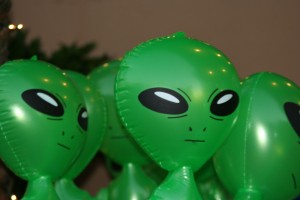 In a critique of my first book ‘Ancestral Dreams’ I was told my aliens were not alien enough. The premise is that these creatures visited earth many thousands of years ago and passed into legend. At first I thought, they’re my aliens, I’ll have them as I want. But then I also understood what he meant; that I needed to make more effort to distinguish them from my human characters, so I made some changes and hopefully achieved that.
In a critique of my first book ‘Ancestral Dreams’ I was told my aliens were not alien enough. The premise is that these creatures visited earth many thousands of years ago and passed into legend. At first I thought, they’re my aliens, I’ll have them as I want. But then I also understood what he meant; that I needed to make more effort to distinguish them from my human characters, so I made some changes and hopefully achieved that.
But that did make me think of other science fiction ‘aliens’ I have seen / read, and how many of those were human like. As a kid my first encounter with an alien was ‘My Favourite Martian’ (for those of you who are old enough), who if memory serves me right had two small antennae denoting him as ‘alien’. There was of course Dr Who, where they had to come up with different alien threats every few weeks, but most (with the notable and wonderful exception of the Daleks) were humanoid based. I guess, not least, because they were played by actors (no CGI in those days). Star Trek did have one episode where the alien was some mist cloud, but its behaviour was that of a small child (yes, it was bizarre). If you think about it the main alien presence was ‘Spock’ denoted by pointy ears and eyebrows and no sense of humour. If slightly odd features and a lack of humour denote aliens then I’ve met many others. There was also Mork in ‘Mork and Mindy’. Mork’s alienness came over as strange behaviour, which in the UK would have been passed off as merely being eccentric.
Then there seemed to be a time of ‘cute little humanoids’, the obvious one being ET. I know this was a children’s film, but around then it did seem to be the common view of ‘aliens’. I remember getting to the very end of ‘Close Encounters’ and what should emerge but little humanoid aliens. And another thing why no clothes? Why do we assume these aliens don’t wear clothes? I remember thinking for ‘Close Encounters’ that it was a good job that they picked the southern US for that first contact. If it had been the north of England in January they might have a) turned round and gone home b) waited until it at least it stopped raining c) and this is the option I had most fun with, emerged wearing red cagoules and wellington boots.
Lately we’ve gone a bit the other way with Avatar, where the aliens were taller than us, but still very much human both in looks and their society. I’ve recently read the excellent books by Michael Hicks and the  Kreelans at first encounter seem more alien. I imagine them as eight foot tall reptilian like creatures. But there society is very human, if somewhat extreme, so they take on human values.
Kreelans at first encounter seem more alien. I imagine them as eight foot tall reptilian like creatures. But there society is very human, if somewhat extreme, so they take on human values.
Denoting intelligent alien species in science fiction I think is a problem for writers. Yes, we have to make them different, but we also have to make it possible for the reader to identify with them, understand them and their motives etc., which naturally humanises them. So, I’m not sure if it’s laziness on our part or just inevitable that we see potential aliens as similar ourselves. I know there have been exceptions, ‘Alien’ for one, with a large drooling hound of hell. But that is for horrific affect. More often than not we see them as ‘different but human’. Perhaps it’s down to some deep seated insecurity as a species that we feel the need to do that. It’s safer somehow if we make them like us. Perhaps until we actually meet some we will continue to do that.
As always your views and you favourite aliens are welcome.
Ian Martyn

We have many of the same memories from growing up 😀
One of my favourite authors, though, is C. J, Cherryh, who writes really alien aliens, if you get my drift. Going with your last observation though, many (though not all by a long way) are based on species we might recognise – ants and lions amongst my favourites.
If you haven’t tried this author, I’d recommend ‘Serpents Reach’ as a great starting point.
Thanks, I’m going on holiday in a couple of weeks – I’ll look it out and take it with me
The Faded Sun trilogy is another great one by her. Enjoy your holiday reading 🙂
Thanks